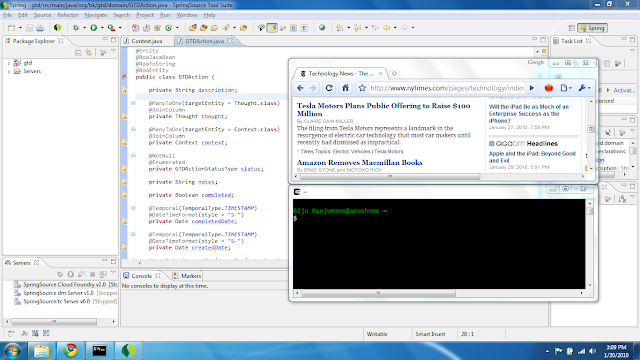A Simple non-threaded (and non-optimized) java implementation for figuring out if a number is a perfect number is the following:
public class SimplePerfectNumberUtil implements PerfectNumberUtil{
@Override
public boolean isPerfect(int aNumber) {
return sumOfFactors(aNumber)==2*aNumber;
}
private int sumOfFactors(int aNumber){
int sum = 0;
for (int i=1;i<=aNumber;i++){
if (aNumber%i==0){
sum+=i;
}
}
return sum;
}
}
Programming Scala book provides a sample scala actor implementation for this by breaking up the task of determining whether a large number is a perfect number by breaking up the large number into a range of smaller numbers - eg. a number like 3000 can be split up into say 0-1000, 1001-2000, 2001-3000, with a task responsible for summing up the factors in each of these ranges and summing up the result.
A slightly modified implementation based on the Programming Scala book is the following:
class PerfectUtilScala {
def isPerfect(candidate: Int) = {
val RANGE = 10000000
val numberOfPartitions = (candidate.toDouble / RANGE).ceil.toInt
val caller = self
val sumoffactorsActor = actor{
loop {
react {
case msg:FactorsRangeForCandidate =>
caller ! sumOfFactorsInRange(msg.lower, msg.upper, msg.candidate)
}
}
}
for (i <- 0 until numberOfPartitions) {
val lower = i * RANGE + 1;
val upper = candidate min (i + 1) * RANGE
sumoffactorsActor ! new FactorsRangeForCandidate(lower, upper, candidate)
}
val sum = (0 /: (0 until numberOfPartitions)) { (partialSum, i) =>
receive {
case sumInRange: Int => partialSum + sumInRange
}
}
2 * candidate == sum
}
private def sumOfFactorsInRange(lower: Int, upper: Int, number: Int) = {
(0 /: (lower to upper)) { (sum, i) => if (number % i == 0) sum + i else sum }
}
}
class FactorsRangeForCandidate(val lower:Int, val upper:Int, val candidate:Int)
A Java Executors based implementation is the following:
public class ThreadPoolPerfectNumberUtil implements PerfectNumberUtil{
private ExecutorService threadpool = Executors.newFixedThreadPool(3);
@SuppressWarnings("unchecked")
public boolean isPerfect(int aNumber) {
int RANGE = Constants.RANGE;
int numberOfPartitions = new Double(Math.ceil(aNumber * 1.0 / RANGE)).intValue();
Future[] sumOfFactors = new Future[numberOfPartitions];
for (int i=0;i{
private final int lower;
private final int upper;
private final int anumber;
public SumOfFactorsTask(int lower, int upper, int anumber){
this.lower = lower;
this.upper = upper;
this.anumber = anumber;
}
@Override
public Integer call() {
int sum=0;
for (int i=lower;i<=upper;i++){
if (anumber%i==0){
sum+=i;
}
}
return sum;
}
}
And a Kilim based actor implementation:
public class ActorsPerfectNumberUtil extends Task implements PerfectNumberUtil {
private Mailbox mailbox;
private Mailbox resultmailbox;
private SumOfFactorsActor sumOfFactors;
public ActorsPerfectNumberUtil() {
mailbox = new Mailbox();
resultmailbox = new Mailbox();
sumOfFactors = new SumOfFactorsActor(mailbox, resultmailbox);
sumOfFactors.start();
}
public boolean isPerfect(int aNumber) {
int RANGE = Constants.RANGE;
int numberOfPartitions = new Double(Math.ceil(aNumber * 1.0 / RANGE)).intValue();
for (int i = 0; i < numberOfPartitions; i++) {
int lower = i * RANGE + 1;
int upper = (i + 1) * RANGE;
if (aNumber < upper)
upper = aNumber;
mailbox.putnb(new FactorsRange(lower, upper, aNumber));
}
int sum = 0;
for (int i = 0; i < numberOfPartitions; i++) {
sum += resultmailbox.getb();
}
if (sum == 2*aNumber)
return true;
return false;
}
}
The codebase along with the Spring Integration based implementation is available at this Git location:
git://github.com/bijukunjummen/Perfect-Number.git

